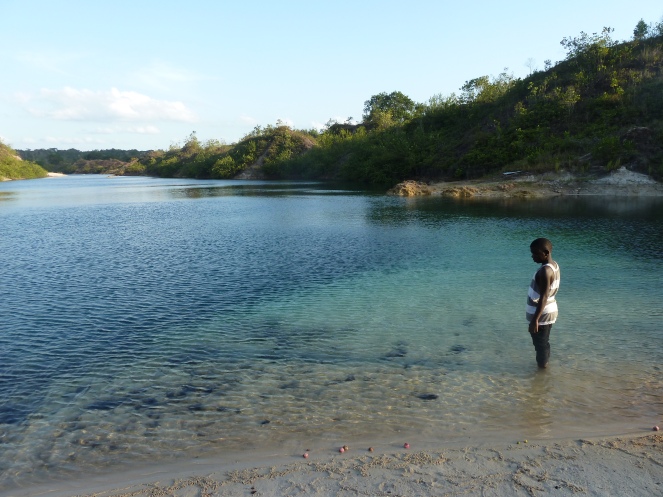
You’ve probably heard it. You may have even said it yourself, breathless with excitement after a trip to an ‘exotic’ travel destination: “I was the only white person for miles!” It’s always niggled for me because I think:
- Why is that an achievement?
- Do you really mean to say: you were the only foreigner?
- If it’s number 2, how do you know? Maybe there was someone from the same town as you back home but they just happen to look like a local.
I thought about this again when travelling to Lethem for the Rupununi Rodeo. A friendly (white, European) couchsurfer invited me to join her and her friends. “Just look for two pickups full of white people!” she joked in her text. I laughed. And it was true – that’s exactly what I found. But once I joined them, what were they then? Two pickups full of white people – and one brown girl? Later one of the group joked about how the “whiteys” should take on the locals in a game of tug-of-war, and I guessed they’d either forgotten I was there, or white was being used interchangeably to mean foreigner.
It’s a curious phenomenon to observe. When a white, European traveller lands into a place where he/she is no longer in the majority, and is suddenly confronted by and super-aware of their colour – something they probably take for granted as the norm most of the time. And it is. In the UK, for instance, 87.2% of the population is White British.
It always makes me think back to the time I went to a club in the UK and my group of friends wanted to leave because they felt out of place, being the only white people is a crowd of black and Asian faces. Never mind that I was one of those non-white faces, or that I frequently found myself in the reverse situation.
Of course being non-white is the norm elsewhere. I once met a poet from Botswana who remembered being stopped at an airport with a friend from the US. This friend was fuming, assuming they’d been pulled over for being black. The poet was amused because she’d assumed it was because they were cute and the security guard was hitting on them. Being black wasn’t her first identifier, because it was the norm in her country.
For me, being of mixed English-Guyanese heritage, identification is often taken out of my hands and is open to interpretation depending on where I am. “Red woman” called a random man in the street in Guyana the other day (I discovered later this means a mix of African and European heritage). “Obruni!” (or ‘white person’) some children used to shout in greeting in Ghana. In Brazil, Spain and countless other places I’ve taken to be a local. Yet in England (even London) I’m assumed to be foreign and constantly asked ‘Where are you from?’
To be honest, I’m over this foreigner/local distinction. The world is not that black-and-white any more. We travel prodigiously, live abroad, eat food from around the globe, watch films in other languages… So I’m always uncomfortable when I run into signs of the old divisions and hierachies. Like when people in Guyana tell me, “You’ll be ok because you’re a foreigner”, “I think so-and-so was trying to show you off as their English friend!” Or when I see young, white travellers decked (non-ironically) in khaki shorts, white shirt and panama hat – looking for all the world like new-age colonialists and all-too quickly slipping into the old dynamic as they unquestioningly lap up the deference and privileges they’re still given in some countries.
And, as much as I protest, I guess I enjoy the benefits too. Probably without even realising it a lot of the time. The other day I walked into a hotel here in Georgetown, asked to use the wifi and was directed to the business centre area where I proceeded to get on with some work in peace. Would I have been welcomed so readily if I didn’t have a British accent? Or was it more to do with what I was wearing? My skin colour? The ‘right’ attitude?
I was discussing these issues recently with friend from the UK who is living elsewhere in the Caribbean. She told me how people there still haven’t quite got their head around the fact that she’s there to stay. “You’re from London? Why would you come here?!” As if, she said, there’s nothing valuable here, nothing that might attract someone with no ties. I can imagine I’d get a similar response from some quarters if I decided to stay on in Guyana: That’s nice, but why?!
The other day I was kindly given a copy of poet Fred d’Aguiar’s 1998 speech ‘Made in Guyana’, and finally got round to reading it today. In it, he highlights the efforts of Guyanese writers such as Edgar Mittleholzer to “answer back” the colonisers and define their world. But in order to do so, says d’Aguiar: “The outside world, the surroundings had to be claimed before there could be the luxury of an inward glance and the self-purging of a centuries-old implanted ideology of inferiority.”
I would expand on this and say that people of coloniser regions, such as myself, must now go on the same journey. Not to claim the world as our own once more, we’ve already had that luxury, but to open that inward eye and gradually self-purge that centuries-old propogated ideology of superiority.